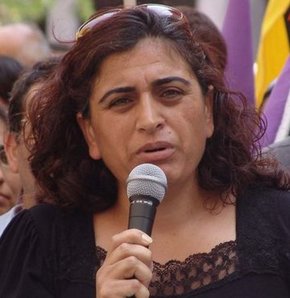By a Correspondent:
The pro-Kurd Peace and Democracy Party (BDP) is set to merge with the People’s Democracy Party (HDP) in a process due to begin soon, when all the BDP deputies in the Turkish parliament will join the HDP. Sebahat Tuncel, co-chair of the HDP, told Radikal in an interview yesterday that the HDP will be re-founded at an upcoming congress. She said a commission is looking into issues such as how to integrate the BDP’s north Kurdistan municipal representatives into an expanded HDP.
The HDP was formed last year as an alliance of Kurds, other national minorities, leftist, women’s and green groups. It is understood that jailed PKK leader Abdullah Ocalan recommended its establishment during his meetings with BDP leaders at his Imrali island prison. In last month’s local elections, the HDP ran a parallel campaign with the BDP. However, it got a low vote (averaging 4%) in western Turkey while the BDP made gains and expanded its municipal power in north Kurdistan.
The merger has been discussed by BDP and HDP officials for some time, but there is opposition to it within both parties. Within the HDP, there are leftists’ concerns that their influence will be reduced and that the re-founded party could become too accommodating to prime minister Erdogan’s government in the coming months. Among Kurdish activists, including BDP supporters, some fear that Kurds’ political profile and national struggle will be weakened, and others say the HDP’s socialist background will alienate religious Kurds.
Asked whether the plan is to establish a new “left wing party”, Sebahat Tuncel replied that it will be “a mass party …for Turks or Kurds, Laz, Circassian, Alevi, secular, religious, Armenian, environmentalists, everyone …Because all these groups have a common problem. No freedom and democracy”.
The HDP aims to win over non-Kurds who see the BDP as a party for Kurds only. Tuncel said it will focus on what unites different groups in society rather than on their differences, promoting a new kind of politics. “The BDP’s party programmes are actually the solution to all Turkey’s problems, but that was not understood”, she said.
Asked whether the HDP can win support from so-called ‘white Turks’ – a term used to describe educated, middle class, Kemalist Turks – Tuncel replied in the affirmative. “There are many reasons for them to vote for us,” she said, adding that Kemalism is outdated and that HDP policies on ecology, women’s rights and democracy can appeal to these voters.
Tuncel acknowledged BDP deputy Altan Tan’s argument that the HDP has failed to win backing from religious voters. “It was the case with the Alevis as well”, she said. “It means we have failed to explain ourselves to them”.
The HDP has reached two important conclusions, she said. One is that the peace process must be seen to benefit not only Kurds but also Turks who want peace. Second, as a result of the Gezi protests, many people in Turkish cities have seen state violence first-hand and now they are more receptive to solving the Kurdish problem.
Tuncel said it has not yet been decided whether the HDP will stand a candidate in the presidential election.
.jpg)



